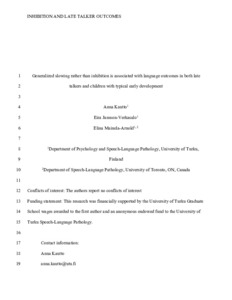Generalized Slowing Rather Than Inhibition Is Associated With Language Outcomes in Both Late Talkers and Children With Typical Early Development
Mainela-Arnold Elina; Kautto Anna; Jansson-Verkasalo Eira
https://urn.fi/URN:NBN:fi-fe2021042822530
Tiivistelmä
Purpose: While most of the children who are identified as late talkers at the age of 2 years catch up with their peers before school age, some continue to have language difficulties and will later be identified as having developmental language disorder. Our understanding of which children catch up and which do not is limited. The aim of the current study was to find out if inhibition is associated with late talker outcomes at school age.
Method: We recruited 73 school-aged children (ages 7– 10 years) with a history of late talking (n = 38) or typical development (n = 35). Children completed measures of language skills and a flanker task to measure inhibition. School-age language outcome was measured as a continuous variable.
Results: Our analyses did not reveal associations between inhibition and school-age language index or history of late talking. However, stronger school-age language skills were associated with shorter overall response times on the flanker task, in both congruent and incongruent trials. This effect was not modulated by history of late talking, suggesting that a relationship between general response times and language development is similar in both children with typical early language development and late talkers.
Conclusions: Inhibition is not related to late talker language outcomes. However, children with better language outcomes had shorter general response times. We interpret this to reflect differences in general processing speed, suggesting that processing speed holds promise for predicting school-age language outcomes in both late talkers and children with typical early development.
Kokoelmat
- Rinnakkaistallenteet [19207]
